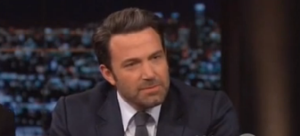Actor, director and all around superstar Ben Affleck made an appearance on the latest episode of “Real Time with Bill Maher”, which aired last Friday. One segment of the show is getting a lot of attention. In the segment host Bill Maher and guest Sam Harris began a discussion in which they allege that liberals in America have underestimated the amount of people in the Muslim world that agree with some of the principles of radical jihad that is played out by ISIS and others. In response, Affleck wasted no time in making it clear that he disagreed with Maher and Harris, calling their comments “gross, racist and disgusting.” Although there were five people in the discussion, it seemed like it was really just Affleck versus Maher and Harris. They went back and forth for ten minutes and in the end Maher relented and declared that they would have to agree to disagree.
After watching that segment I was really disappointed at the breakdown in communication and I think it exemplified a larger failure in our society when it comes to dealing with social issues. There are too many people talking past each other.
First, I think this topic is clearly worth discussing. If we want to deal with ISIS it makes sense to have an accurate understanding of the expansiveness of their ideology. Part of the reason that ISIS has become such a problem today is because they were underestimated early on and referred to as the “JV team.” Having an accurate picture of what we are dealing with puts us in a better position to coordinate an appropriate response.
Maher seemed to think that political correctness has caused liberals to adopt the narrative that radical principles in the Muslim world represents a fringe element. He and Harris referred to numerous polls and anecdotes suggesting that more people in the Muslim world agree with radical principles than liberals care to admit. If this claim is legit, it would be a fatal error to ignore it.
On its face, this argument seems race-neutral and not very controversial. We’re just trying to assess how widespread an ideology is. Unfortunately, that’s not how Ben Affleck saw it. Ironically, Affleck responded with the same knee-jerk reaction that Maher was complaining about. It seemed that Affleck took Maher’s statements as a thinly veiled excuse for Maher’s racism and bigotry.
I usually don’t see eye to eye with Bill Maher because he never misses an opportunity to insult Christians or people with religious beliefs in general. Also, some of his comments were clearly over the top. However, I have to admit that I think his assertions seemed plausible. Maybe we aren’t taking the reach of radical Islam’s ideology seriously enough. Last night “60 Minutes” even had a segment about the surprising number of Americans that have joined ISIS. The problem with Affleck (and with discussions about controversial topics in general) is that he responded by attacking Maher rather than addressing Maher’s arguments. Instead of citing polls that refuted Maher’s argument or laying out how Maher’s evidence was biased, Affleck’s first move was sarcasm and name-calling.
Let’s be clear, if we want to improve the world, we need to have open dialogue about tough issues. I think it’s wrong to automatically assume that when a White person offers a criticism, they are really masking their racism or hatred. Given America’s history of racism, I can see why we might be suspicious of their motive for offering such a controversial view-point. They very well could be trying to justify their racism. However, we have to carefully analyze what is being said. If we call any and every criticism racist, then it makes progress difficult. When somebody presents evidence to support a position, I think a person should try to respond with a counter argument rather than just dismiss the evidence because it goes against what they might believe.
Sadly, Michael Steele, who was also on the panel, had a response that was appropriate and convincing, yet his comments aren’t the ones that have gotten noticed. Steele gave an accurate synopsis of what Maher actually said and granted that it was a fair point to a certain extent, but he then countered that the media doesn’t show enough examples of outspoken Muslims who are against radical jihad and that Maher failed to include that factor in his analysis.
When we discuss controversial topics, I think we should try to give people the benefit of the doubt when they express opinions with which we disagree. Sadly, basic conversational etiquette is lacking these days and the loudest person usually gets all the attention.

